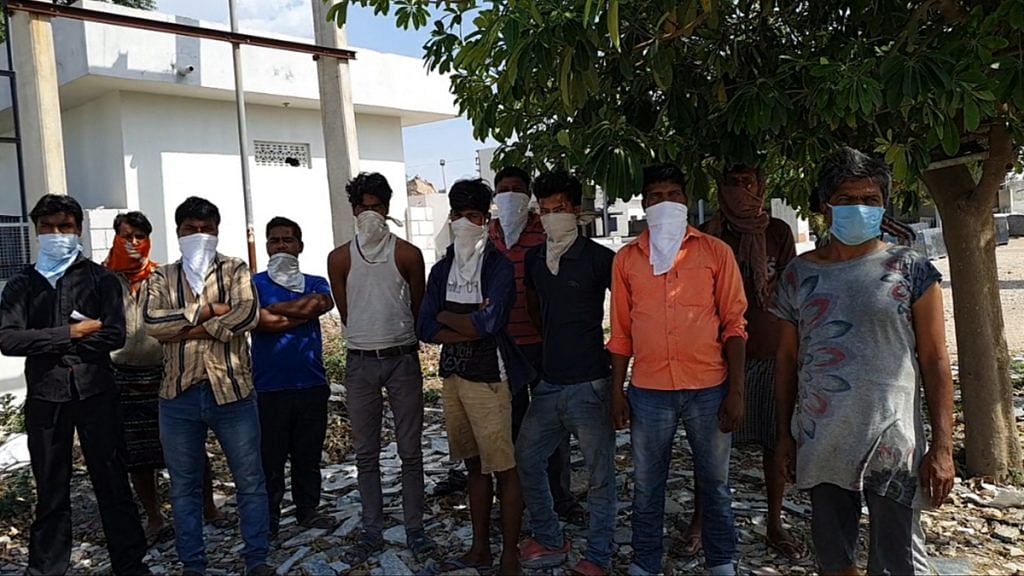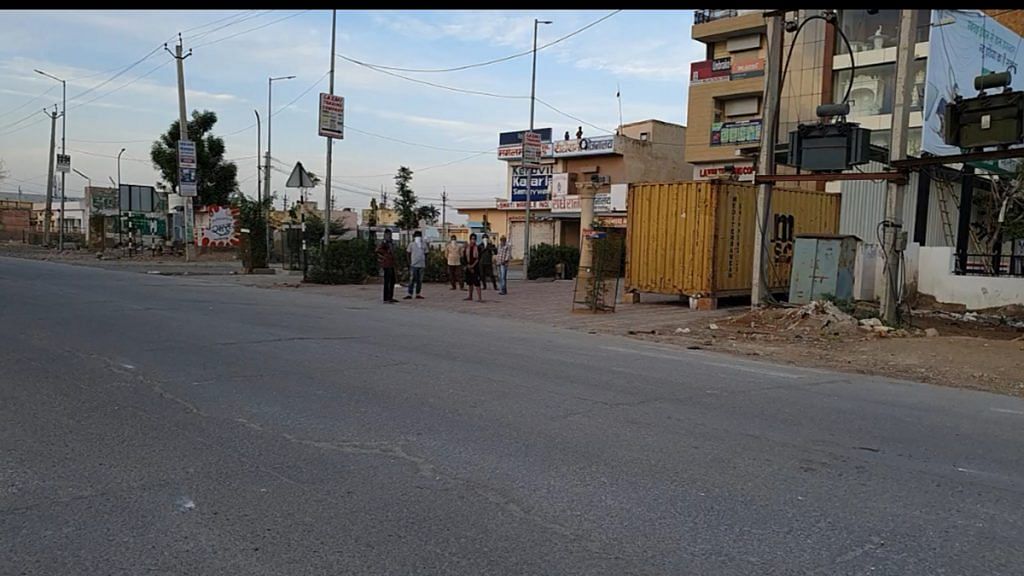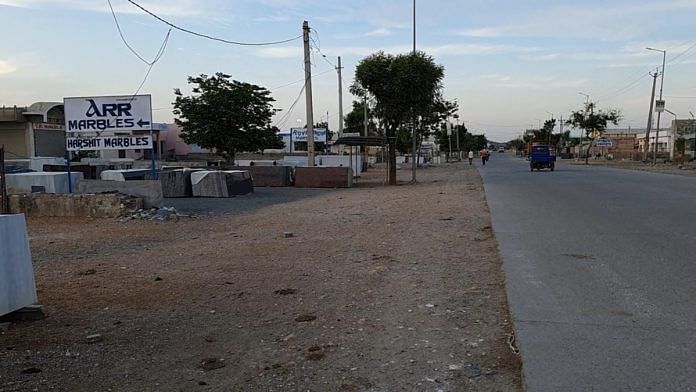Kishangarh: Once known as the largest marble market in Asia, Kishangarh in Rajasthan now appears like a ghost town. Not a single person can be seen on the roads lined with marble processing units and closed factory shutters.
Kishangarh is part of Ajmer district, a Covid-19 red zone, but there is only one case in the rural part of the town. The novel coronavirus lockdown has, however, severely impacted the marble industry, halting all operations due to the restrictions imposed.
“The whole industry has come to a standstill. Factories are closed, godowns are full and owners are sitting at home,” said Subhash Agarwal, director, finance, at R.K. Marble, one of the largest marble factories in the area.
“More than 300 truckloads of marble and granite used to be transported out of the market, (but) no truck has left since the last week of March,” he added.
Also read: This 19-yr-old in Vadodara tested positive for Covid seven times, but never showed symptoms
Workers desperate to go back
The situation is even worse for the migrant labourers who worked in these factories. After two months of no work, several labourers left for their native villages, but there are many who are still stuck in the town and are staying in cramped quarters within factory premises, with little food and money.
“I have never seen such bad days. I have been surviving on one meal a day,” said 19-year-old Bajrangi Kumar, who has been working here since last year.
Clad in a thin, torn vest with a towel wrapped around his waist, Kumar said he wasn’t afraid of the virus and just wanted to go back home, especially since they were not being paid any wages.
After working for 12 to 14 hours a day, he could earn approximately Rs 8,000-10,000 a month, a large part of which he sent back to his family in Bihar’s Darbhanga. Kumar said they had been paid wages for the month of March but not April.
“The contractor gives us money from the salary he hasn’t paid us, that’s how we buy our rations but it is expensive,” he said, adding they were paying up to Rs 50 for a kilo of potatoes.
He is one of more than 4,000 such labourers still living in these factories in Kishangarh.
A group of labourers from Bihar working in the marble factories told ThePrint that they have the e-pass that will allow them to travel but they are unable to walk back due to police action.
“We can do something at home, it is better than sitting idle here,” said Bhairav, who is from Bihar.
“We are beaten by the police when we go and ask the associations about when we can go home,” he said. “They don’t even bother listening to why we are on the streets.”
According to Devendra Kumar, Sub-Divisional Magistrate of Kishangarh, the police had to resort to strict action as the people were not maintaining social distancing.

Factory owners want workers to stay
The factory owners, however, have their own reasons for making the migrant workers stay.
“How are we going to begin our factories if the workers want to go home?” Aditya Daga, owner of a marble factory, asked. “We are providing them with food and shelter, tell them to please stay where they are,” he said, adding they were facing the heat from banks to repay their loans.
“We have to go home, we can’t stay back even if the factory reopens,” said Dinesh Kumar Yadav, another worker, in response. “We have to first see our families, take care of them and then we will come back when things return back to normalcy.”
Meanwhile, the administration also said it could not send the workers back. According to Kailash Chand Sharma, Additional Collector (Administration), Ajmer, they had received instructions from the state home department that only those workers who are stranded should be sent back to the states, not those who are currently employed in factories.
“We have issued the e-pass but we will wait for the central and state governments’ orders to come before taking a decision,” he added.

Also read: Why Railways is unlikely to pay compensation for 16 migrants killed in Aurangabad
Covid impact on marble industry
Kishangarh’s marble and granite industry is spread across 40 kilometres, with 1,100 units and 25,000 workers, said a member of the Kishangarh Marble Association. Before Covid-19 hit the country, it did business of upto Rs 9 crore every day, he added.
In the past few years, the marble industry has faced several setbacks — demonetisation in 2015 and the implementation of the open general licence in 2016 that allowed import of marbles, impacting the processing of local marble, said an industry insider. The coronavirus lockdown is like another nail in the coffin.
Kumar said the administration had allowed industries in the Rajasthan State Industrial Development and Investment Corporation (RIICO) area to gradually begin production, provided safety guidelines like masks and sanitisers are followed.
“Some big industries, including marble units, will start functioning when they get their labour and their demand in place,” he said.
The marble industry, however, will take some time to get back on its feet, according to industry insiders.
R.K. Marble’s Agarwal believed the factories may not start working even when the restrictions are eased because of the unsold goods in the inventory. Since marble is a luxury item and construction activities have been suspended, he said, there is a remote possibility of demand for marble anytime soon.
Also read: Modi govt promised free pulses to 20 crore, only 18% have got them so far



